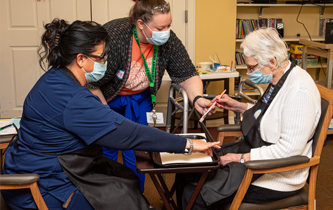
Alzheimer’s disease and other forms of dementia typically progress in three stages: early, middle, and late. In the early to mid-stages, an individual’s short-term memory is primarly impacted. For example, a person may have trouble coming up with the right name or word, forget information they just learned, or ask the same questions over and over. However, with gentle reminders and a little extra daily help, it’s possible for people in the early to mid-stages of dementia to continue enjoying the activities and aspects of life that are most important to them.
During these beginning stages, assisted living memory care can be highly beneficial, helping those with dementia live well and maintain their independence for longer as their disease progresses. If you’re considering assisted living memory care for a parent or loved one, you might be wondering what to expect once they move into their new community.
What is Life Like in Assisted Living Memory Care?
Memory care is designed to offer a soothing, secure environment where residents enjoy routines that fit their wishes, abilities, and interests. These specialized communities also provide access to 24-hour personalized care and support with activities of daily living, dementia-trained staff, and innovative activities and therapies to help residents make the most of every day.
No two memory care communities are exactly alike, so it’s important to research, take tours, and ask questions to find the best fit for your loved one.
To give you a better idea of what life is like for memory care residents, here’s an inside look at some of the programs, services, and activities offered at Pavilion, Bethany Village’s newly-renovated Assisted Living Memory Care community:
Memory-enhancing activities
A daily routine is highly beneficial for people in the early to middle stages of Alzheimer’s or dementia. While memory care residents are free to spend their days as they choose, knowing what to expect provides comfort and familiarity. Scheduled activities help to establish a sense of time, which may ease the stress and anxiety that often comes with short-term memory loss.
At Pavilion Assisted Living Memory Care at Bethany Village, each morning starts with our Life Enrichment team reading from a daily publication designed to help residents acclimate to the day, year, and month as well as connect with current and past events. Other memory-enhancing activities include Conversation Starters, which gives memory care residents a chance to express themselves and share stories with caregivers and fellow residents. In addition, trivia and word games encourage residents to interact, communicate, and form friendships.
Exercise for mind and body
Physical activity is another powerful way to boost the health and wellbeing of individuals in the early to middle stages of Alzheimer’s or dementia. In assisted living memory care, residents have the opportunity to participate in light fitness activities such as chair yoga, line dancing, balloon toss, Bocce Ball, Fit Beat drumming, Tai Chi, walking, and other lively, movement-based programs. Regular exercise has been shown to boost cognitive function and help combat changes in the brain associated with dementia.
Music, pet, and art therapy programs
The personalized memory care programming at Bethany Village also includes innovative music, pet, and art therapies to promote memory, communication, and a sense of self.
In music therapy, a Certified Music Therapist uses the universal language of music to create opportunities for self-expression, reminiscence, and interpersonal connection. Memory care residents participate in music-related activities ranging from singing familiar songs to playing instruments and even songwriting.
Pet therapy involves interacting with therapy animals such as dogs, rabbits, birds, and even a miniature horse. Simply petting or holding an animal is known to reduce stress and anxiety, providing a sense of calm and comfort to individuals with Alzheimer’s or dementia.
Finally, art therapy is a powerful means of engagement and self-expression for anyone, especially those in memory care. Bethany Village offers Opening Minds through Art (OMA), an award-winning, evidence-based, intergenerational art-making program that gives residents the creative freedom to express themselves and connect with others through painting, drawing, crafting, and other artistic pursuits.
Relaxation techniques
It’s common for people living with Alzheimer’s or dementia to experience “sundowning,” a sense of restlessness, ??confusion, or irritability that occurs in the late afternoon or evening hours. As a result, it can be difficult for them to fall asleep and stay asleep throughout the night.
To alleviate the effects of sundowning, Bethany Village offers a special turn-down service to help assisted living memory care residents prepare for a calming, relaxing evening. Caregivers will assist residents with their nightly routine, including washing their face, brushing their teeth, putting on pajamas, and turning down their sheets. Spending one-on-one time with each resident before bedtime helps them wind down and enjoy a more restful night’s sleep.
Choosing an Assisted Living Memory Care Community
When your loved one is in the early to middle stages of Alzheimer’s or dementia, it’s essential to find the balance between independence and assistance. Pavilion Assisted Living Memory Care at Bethany Village is more than a safe, secure place to live; it’s an engaging community where residents with Alzheimer’s or dementia thrive under the care of skilled, compassionate staff. Because Pavilion is a part of Bethany Village’s continuum of care, which includes skilled nursing memory care, families can be confident that their loved ones will be surrounded by Faithful Caring in every stage of their disease.
To learn more about Pavilion Assisted Living Memory Care and arrange a private tour, please contact us today.
